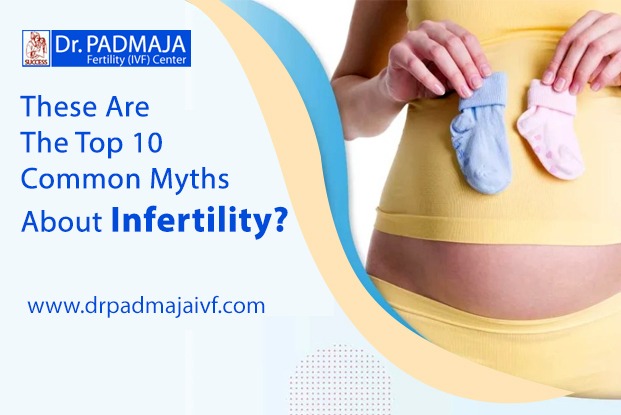For many couples, dealing with infertility can be a difficult and emotional experience. Despite advancements in medical science and the availability of resources, misconceptions about infertility persist. Here, we debunk the top 10 common myths about infertility, helping to clarify misunderstandings and guiding you toward the best IVF center in Hyderabad, like the renowned Dr. Padmaja IVF Center.
Myth 1: Infertility is a Woman’s Problem
One of the most pervasive myths is that infertility solely affects women. In reality, infertility can stem from issues in both partners. Approximately 40% of infertility cases are due to female factors, while another 40% are attributed to male factors. The remaining 20% may involve a combination of both or remain unexplained. Couples facing difficulties should consult specialists at reputable facilities like the Dr. Padmaja Fertility Center for a comprehensive evaluation.
Myth 2: You Can’t Get Pregnant After a Certain Age
While age does play a significant role in fertility, particularly for women, it’s not an absolute cutoff. Many women in their late 30s and early 40s have successfully conceived with the help of assisted reproductive technologies. The best IVF center in Hyderabad can provide tailored options for women of various ages, emphasizing the importance of individualized care.
Myth 3: Infertility is Always Permanent
Many people believe that once diagnosed with infertility, it is a permanent condition. However, this is not the case. With advances in fertility treatments such as in vitro fertilization (IVF), many couples can achieve pregnancy. Centers like Dr. Padmaja IVF Center are equipped with various techniques and technologies to help couples explore their options and increase their chances of conception.
Myth 4: Stress Causes Infertility
While stress can affect overall health and may impact fertility indirectly, it is not a direct cause of infertility. Fertility and stress have a complicated relationship. Couples experiencing stress due to infertility might benefit from counseling and support, available through fertility clinics. Addressing mental health can improve emotional well-being and possibly enhance fertility outcomes.
Myth 5: You Have to Try for Years Before Seeking Help
Some couples believe they must wait for years of trying before consulting a fertility specialist. In fact, medical professionals recommend that women under 35 seek help after one year of unsuccessful attempts, while those over 35 should consult a doctor after six months. Early intervention can lead to better outcomes, making clinics like the Dr. Padmaja Fertility Center an excellent choice for timely care.
Myth 6: If You’re Healthy, You Can’t Be Infertile
Being healthy does not guarantee fertility. Many factors, including hormonal imbalances, genetic issues, and environmental influences, can contribute to infertility, even in otherwise healthy individuals. Regular check-ups and consultations with specialists can help identify any underlying issues early on.
Myth 7: IVF Always Results in Pregnancy
While IVF is a highly effective fertility treatment, it does not guarantee pregnancy for every couple. Success rates can vary based on factors such as age, health conditions, and the reason for infertility. The top IVF facility in Hyderabad, such as Dr. Padmaja IVF Center, provides realistic expectations and personalized treatment plans to enhance the chances of success.
Myth 8: All Infertility Treatments Are the Same
Not all infertility treatments are created equal. The effectiveness of various treatments depends on individual circumstances, including age, health, and the underlying cause of infertility. A comprehensive evaluation at a specialized center like Dr. Padmaja Fertility Center can help determine the most appropriate treatment for each couple.
Myth 9: Lifestyle Choices Don’t Impact Fertility
This myth can have significant consequences. Factors such as smoking, excessive alcohol consumption, poor diet, and lack of exercise can all negatively impact fertility. Making healthier lifestyle choices can improve both male and female fertility. It’s crucial for couples to consult their fertility specialists for personalized advice on improving their reproductive health.
Myth 10: Infertility Only Affects Couples in Their 30s and 40s
Infertility is often perceived as an issue primarily affecting older couples, but it can impact individuals of any age. Factors like medical conditions, hormonal issues, and lifestyle choices can lead to infertility in younger individuals as well. It’s essential for anyone experiencing difficulties to seek professional help, regardless of their age.
Conclusion
Understanding the realities of infertility can help couples navigate this complex journey with greater clarity and support. By debunking these common myths, we aim to empower individuals to seek the help they need. If you’re facing challenges with fertility, consider consulting with specialists at the best IVF center in Hyderabad, such as the Dr. Padmaja IVF Center. With their expertise and personalized care, you can find the right path toward starting or expanding your family. Keep in mind that there are resources available to support you at every stage and that you are not alone.
About The Author :

If Dr. Padmaja Divakar is a public figure or a professional in a specific field, I recommend checking her official website, professional profiles, or reliable online sources for the most up-to-date and accurate information about her background, qualifications, and achievements.
Frequently Asked Questions (faqs)
1.Is infertility solely a woman’s issue?
No, infertility affects both men and women. About 40% of infertility cases are related to female factors, 40% to male factors, and the remaining 20% can involve a combination of both or remain unexplained. Both partners should be evaluated when facing infertility challenges.
2.Can you still get pregnant after 35?
Yes, many women over 35 can conceive. While fertility does decline with age, especially after 40, assisted reproductive technologies like IVF have helped many women achieve pregnancy later in life. Consult a fertility specialist for personalized advice.
3.Once diagnosed with infertility, is it permanent?
Not necessarily. Many couples diagnosed with infertility go on to conceive, especially with the advancements in fertility treatments. Seeking help from a fertility clinic can open up various options for treatment and support.
4.Does stress cause infertility?
Stress does not directly cause infertility. However, it can impact overall health and reproductive function indirectly. Addressing stress through counseling and support can improve emotional well-being and may enhance fertility outcomes.
5.How long should you try to conceive before seeking help?
It’s recommended to consult a fertility specialist after one year of trying if you’re under 35, and after six months if you’re over 35. Early intervention can lead to better chances of success in achieving pregnancy.

